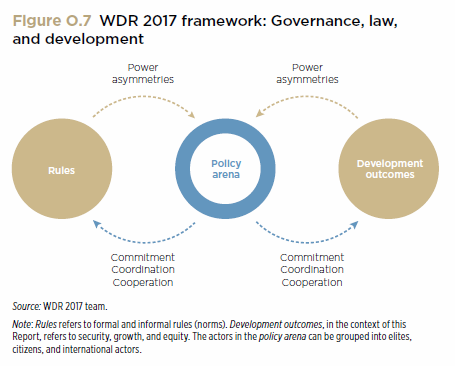In 1926, John Maynard Keynes said that “everything is politics, nothing is policies”. Has the World Bank discovered this truth for itself? What does the 2017 World Development Report say about governance, politics and power? Its very title – Governance and the Law – tries its best to put us off. It sounds more like a learned journal written by be-wigged barristers than one in a series of the most important development publication to emerge every year.
So what makes a powerful and effective report? Is it the painstaking research and data gathering? Is it the detailed analysis of multi-country experience? Is it the many cases studies illustrating the issue at hand? No. As Duncan Green pointed out in his ‘Poverty to Power’ blog, it is “a memorable meme, diagram or proposition that will stick in people’s heads, and find its way into policy papers and decision-making over the next few years.”
Which World Development Reports do you remember? The 1997 report on the changing role of the state – ‘matching role to capability’? A miracle of brevity and relevance in four words. Or perhaps the 2004 report with its now famous triangle diagram and the discussion of the respective merits of the short and long routes to accountability? Or the 2011 Conflict report and its spiralling corkscrew path out of conflict?
The power of the World Development Report lies in its potential to simplify reality and make it accessible to us mortals…those of us who are practitioners. The numbers of “governance and conflict advisers” has grown dramatically over the last decade; DFID now has about 160. They are an impressive group – I had the privilege of joining them in September this year for their bi-annual professional development conference.
Report Should Resonate Emotionally, Intellectually
While this group – and doubtless others in the development community – do not aspire to be professional scholars, we do aspire to be scholarly professionals. And to this group the World Development Report really does matter. We are the ones who have to wrestle with local power structures, interpret the nature of the ‘political settlement’ and provide advice on what we judge to be both technically appropriate and politically feasible. So the headline, the modelling and the framing of the report must resonate both intellectually and emotionally if it is to make an impact.
Does it pass this test? Despite the excellence of its analysis and its dissection of the importance of power, elites and incentives, the report leaves the reader simultaneously overwhelmed and underwhelmed. Overwhelmed because there are 300 pages of closely argued and quite sophisticated conceptualization; underwhelmed because there is no one simple memorable or resonant “meme, diagram or proposition”.
My own attempt to summarise the report would run something like this:
There are three elements that influence the effectiveness of public policy making and implementation. Commitment refers to the consistency and credibility of policies and how they extend beyond the short-term nature of the political cycle. Coordination refers to the extent to which investment decisions and the expectations of market participants are coordinated through coherent institutions. And cooperation refers to both citizen willingness to contribute to public goods and not ‘free-ride’ on others, as well as the extent to which individuals and firms are willing to comply with the laws of the land.
Hardly memorable. These everyday “c words” of course are being used with specific, technical meanings. One could argue that this is clever drafting by the Bank team as nobody can be against commitment, coordination and cooperation. They are all, self-evidently, Good Things. But unpack them and we discover another, rather longer, long list of c words: collective action problems, clientelism, capture, compliance, and contestability.
The diagram (below) that accompanies the high- level framing fails immediately to resonate. Unless the reader is willing to invest serious time in understanding the technical meaning of all the c words, the diagram is a little hard to fathom. It is not intuitive. Does it add to an understanding of how governance, politics and power work in the country where I am working? Can I use it to frame my argument about this investment as against that investment? Readers can answer these questions for themselves.

This is the “glass half empty” perspective. There is also a “glass half full” view. As Duncan pointed out in an earlier blog, the WDR makes “a huge contribution in that it squarely locates power as a core issue both to understanding and influencing development.” It identifies the “policy arena” as the missing link between formal rules and development outcomes.
From Print to Practice
The policy arena is where all the interesting stuff happens: where different groups bargain over cash, policies and implementation.” Bravo. And the report – if one sticks with it over its 300 pages – makes it abundantly clear that as Keynes said, politics dominates policies every time. We know this from our own lived experience.
Unusually, the power of the WDR comes in smaller bits and pieces, chapter by chapter, incrementally. The three principles for ‘rethinking governance for development’ (page 29) are to be welcomed; for institutions think function not form; for administrative capacity think power not TA; and for the rule of law think role of law too.
None of these are in any way new to the governance community, but they may now be brought to the attention of the broader development community. The stories told about governance and growth, governance and security, governance and equity, all stand by themselves and will repay a close read by all working in these areas. Chapter seven on elite bargains and the importance of the political settlement is particularly good: if there is one chapter that deserves to be in the forefront of our thinking when we engage in investment selection and programming, this is it.
The fact that there is a WDR solely on governance should absolutely be welcomed. It is difficult to imagine a report like this being released even 10 years ago. But the hard question that has to be asked is whether it will shift thinking and practice. For governance practitioners it will certainly be useful to legitimize our work. Beyond that I fear it may not have the impact we would like.

Hi Graham, yesterday at the Australasian Aid conference listening to presentations by Lisa Denney, Doug Porter and David Craig about specific examples of institutional shifts what was striking to me was the way the diagram at the centre of the report came to life.
A bit like a moving infinity sign https://www.youtube.com/watch?v=68lVbmYkskE
What I found useful about that was this brought the discussion of ‘changing the rules of the game’, and Adrian Leftwich’s notion of ‘games within the rules’ together in a more dynamic way than is often done as it describes how one might also ‘play the game to change the rules’.
LikeLike
Hi Graham, I really enjoyed reading your analysis of the 2017 WDR! Really insightful. I have one question, I was hoping you could answer – why do you think the World Bank chose to prioritise examining governance and ‘law’ (as opposed to other fields, like service delivery)? I realise other fields are examined throughout the report, but wondering why ‘law’ was put up in lights?
LikeLike
Mia
A good point. In many ways the title of the WDR is very misleading. It is much less about ‘formal laws’ than about ‘informal institutions’. My best guess is that when ‘governance’ was first proposed as a topic for the 2017 report, the powers that be thought it safest to frame the report in this way – much harder to disagree with, or question the meaning of, ‘governance and the law’ than say ‘governance and institutions’.
Graham
LikeLike
I think you’re right on that guess Graham. Re Mia’s question – I thought David Booth’s blog captured well the “unhelpful” nature of the WDR title: https://www.odi.org/comment/10488-two-landmark-publications-world-bank-and-dfid-bring-good-fit-governance-mainstream
David’s piece also provided a useful perspective on the kind of influence the WDR might have through weaving the threads that link the ideas in the WDR and the DFID Economic Development Strategy – none of these happen in a vacuum, and as you point out the memorable WDRs capture a set of emerging ideas and help push the wave of influence. This one does a good job in that respect, even despite the title 🙂
LikeLike
Hi there, You have done a great job. I’ll certainly digg it and personally recommend to my friends. I’m confident they’ll be benefited from this web site.
LikeLike